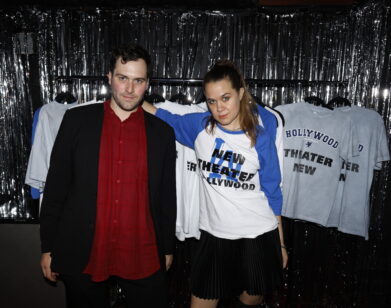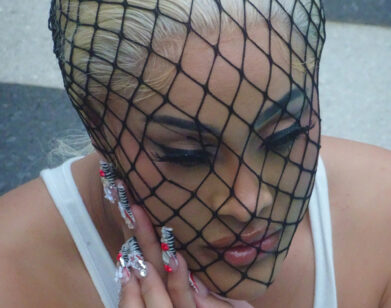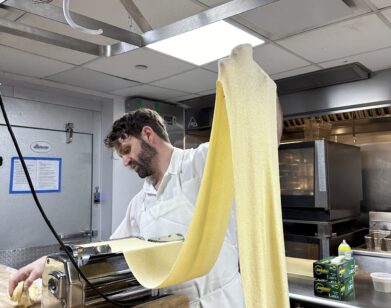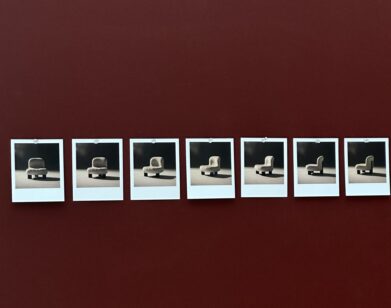What’s Eating Jami Attenberg?
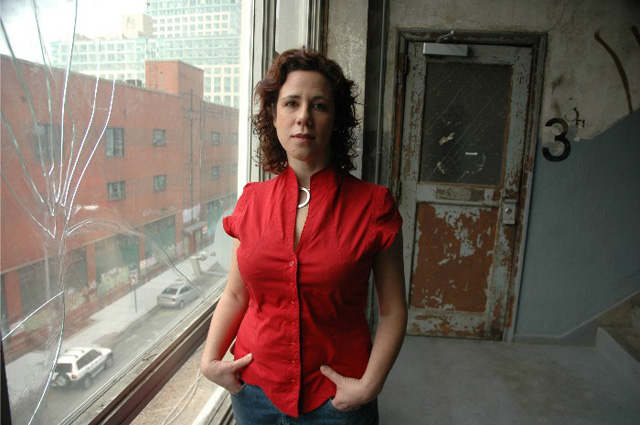
ABOVE: JAMI ATTENBERG
Jami Attenberg’s The Middlesteins (Grand Central) is a juicy, delicious, dark smorgasbörd of a novel. Following a Midwest family that is forced to face or ignore its problems when its matriarch, Edie Middlestein, begins to eat herself to death, Attenberg both comically and with immense insight captures the desperate love that glues family together in times of crises. Yet, there is also a hot pain in the events that unfold as a result of Edie’s eating: her husband leaves her, her daughter’s drinking escalates, her son’s marriage begins to crumble as his own children’s fraught b’nai mitzvah approaches. Through all this, the family remains locked in struggle, even if they have a hard time breaking silence to confront the rich and ragged emotions running through them. Attenberg serves a perfect platter of bottomless longing, destructive desire, and the demands love makes. We sat down with Attenberg in her Williamsburg loft to talk about addiction, French fries and a hot dog emporium, confrontation, family, and how much is too much to ask of them.
ROYAL YOUNG: How do you get to the point where you’re too fat to live? What doesn’t stop people?
JAMI ATTENBERG: This book was an exploration of that; I was trying to figure it out. I smoked cigarettes for a really long time. Even though I knew cigarettes were terrible for me, I smoked a pack a day. It was like a logic that was off in my head. I did drugs for a long time, even though they were expensive and bad for me and made me miserable. The interesting thing about overeating or being obese is there’s this physical manifestation of it.
YOUNG: Right. It’s in plain sight.
ATTENBERG: You can’t hide that.
YOUNG: I am in the process of quitting smoking, but smoked for 10 years, and drugs, totally. But I feel like with eating, it’s different. Because there’s more of a need for your family members to be involved in your habit on a regular basis.
ATTENBERG: Right. There’s witnesses. Though in the book, she becomes a secret eater. But there’s still witnesses, because she’s physically so large and her health is in decline. When I was writing the chapters where you see her in the past and how she got there, I was interested in how her emotions and eating started out in this pure place and became too intertwined. Somewhere along the way she lost track of the difference between feeling and eating. If you don’t keep track of it or maybe your parents didn’t know how to eat properly, or gave food as an inappropriate reward. There are generations of people who don’t know how to eat properly. This is very preachy, and I don’t mean it to be. My parents were young parents and I grew up in the ’70s, and we ate fast food and no one was talking about it.
YOUNG: Right, and now we have that awful large-soda ban.
ATTENBERG: [laughs] Yes. I don’t really eat McDonald’s anymore, but I’m on a the road a lot and it’s always a struggle to find something and eventually you’re like, I’m just going to eat French fries. I also grew up in the Midwest, so it was hot dogs and Italian beef sandwiches, and it was fun to go out, and it was a treat to eat these delicious salty, meaty, cheesy foods. When I go home, I’m going to Hot Doug’s, which is like the best hot-dog place ever. It’s an encased meat emporium.
YOUNG: When you have a habit and you know it’s bad, but you have a dogged determination to self-destruct, how does that affect the people around you?
ATTENBERG: It says a lot about the family members and the state of the family to start with. If you don’t have a stable place to start in, it’s going to be really hard to contend with that. I just feel like we’re now in this world where it’s too easy to BCC your family members or forward something that pisses you off—not confront things when they need to be confronted. Even in the society where they have that TV show Intervention, we find it so hard to talk about these things.
YOUNG: Well, it’s like they need to be on TV to even have the fucking intervention in the first place.
ATTENBERG: [laughs] Exactly. Of course, I’m totally obsessed with that show. I broke my ankle four years ago. And I was trapped in a cast in a house in LA with all these painkillers and I would watch Intervention all day and be like, “I’m not a drug addict! Because they just took 80 Xanax and I’ve only had 2 Percocet today.”
YOUNG: [laughs] That’s awesome.
ATTENBERG: Yes. But, even though we live in this really violent nation, emotional honesty or confrontation is really hard.
YOUNG: How much should we give to people we love?
ATTENBERG: I’m a really selfish person. But I would do anything for my friends. You should take of yourself, too, though. I like to hide, I like my space, but money is irrelevant. So many people have helped me out in my life so much, and I know my selfishness is more of a safe-space selfishness.
YOUNG: Right, you feel like you need to protect.
ATTENBERG: Yes, and that’s totally tied into who I am as a writer. But I think of being of service actually quite a bit. As creative people, we should be really conscious of being of service in our work, being as generous as we can.
YOUNG: Also, when do we draw the line? When are we like, “No, that’s asking too much?”
ATTENBERG: In theory you would give as much as you can, but some people will take as much as they can too. I think if you surround yourself with people you trust and love and you can put your heart into their hands, then you don’t ever have to ask that question.
THE MIDDLESTEINS IS OUT TOMORROW.

